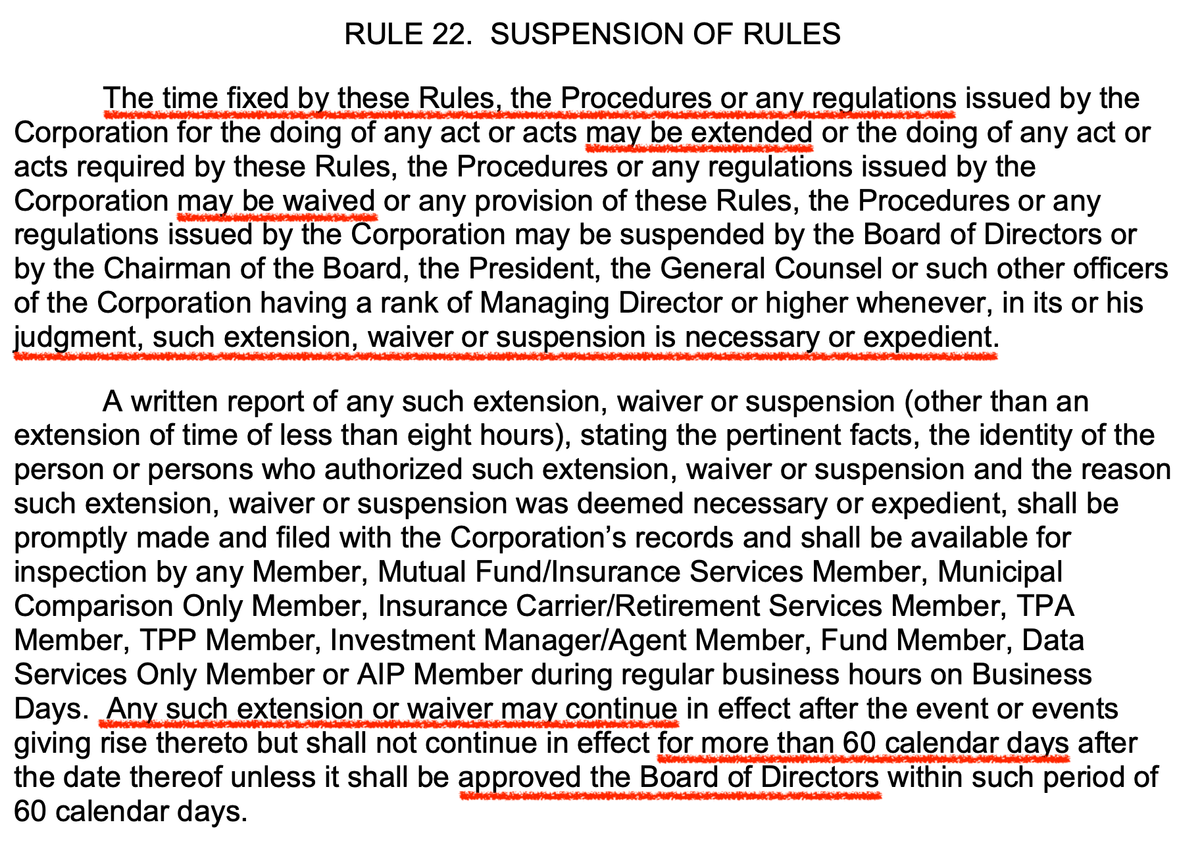SEC Alert! Proposed Rule OPEN for Comment to Require Daily Computation of Customer and Broker-Dealer Reserve Requirements under the Broker-Dealer Customer Protection Rule.
SEC Alert! Proposed Rule OPEN for Comment to Require Daily Computation of Customer and Broker-Dealer Reserve Requirements under the Broker-Dealer Customer Protection Rule. SEC also seeking feedback on whether similar requirements should be applied to broker-dealers & security-based swap dealers.

Wut mean?
- The SEC is proposing changes to the broker-dealer customer protection rule.
- This amendment would require certain broker-dealers to calculate their customer and broker-dealer reserve requirements and make any necessary deposits into their reserve bank accounts on a daily basis, instead of weekly.
- The SEC is also seeking feedback on whether similar daily reserve computation requirements should be applied to broker-dealers and security-based swap dealers for their security-based swap customers.
Background:
- The SEC is proposing an amendment to the broker-dealer customer protection rule.
- This rule requires broker-dealers, who maintain custody of customer securities and cash, to have a special reserve account at a bank.
- This account must hold cash and/or qualified securities in an amount determined by a computation of the net cash owed to the broker-dealer’s customers.
- Currently, these computations and required deposits into the customer reserve bank account are performed weekly.
- However, the proposed amendment would require broker-dealers, who have large amounts of cash owed to customer and PAB accounts holders, to perform these computations and make any required deposits daily instead of weekly.
- The aim of this proposal is to reduce the risk caused by a mismatch between the net amount owed and the amount on deposit for broker-dealers where this difference could be substantial.
- Large mismatches can lead to significant shortfalls in the amounts available in the customer and PAB reserve bank accounts if the broker-dealer fails financially.
- This could result in large-scale harm, such as delayed satisfaction of customer or PAB account holder claims for securities and cash, or substantial losses if a broker-dealer with a large mismatch is liquidated.
Current Requirements of Rule 15c3-3 and its Relation to SIPA:

Wut mean?:
Currently, the rule requires broker-dealers to take two main steps:
- Maintain physical possession or control over customers' fully paid and excess margin securities. These securities must be held in specific locations and free of liens or any other interest that could be used by a third-party to secure an obligation of the broker-dealer.
- Maintain a reserve of funds or qualified securities in an account at a bank that is at least equal in value to the net cash owed to customers. This account must be titled "Special Reserve Bank Account for the Exclusive Benefit of Customers".
These steps are designed to segregate customer assets from the broker-dealer's business activities. If the broker-dealer fails financially, the customer assets should be readily available to be returned to the customers. If the broker-dealer is liquidated, the customer assets should be isolated and readily identifiable as "customer property", available to be distributed to customers ahead of other creditors.
Rule 15c3-3 – Proprietary Accounts of Broker-Dealers:

Wut Mean?
- Broker-dealers are required to perform a separate reserve computation for PAB accounts, establish and fund a separate bank account titled "Special Reserve Bank Account for Brokers and Dealers" (PAB reserve bank account), and maintain physical possession or control of non-margin securities carried for a PAB account holder.
- These requirements aim to reduce the risk that, in the event a carrying broker-dealer is liquidated under the Securities Investor Protection Act (SIPA), the claims of SIPA customers will exceed the amount of customer property available, thereby exposing the SIPC Fund and potentially SIPA customers to losses.
The amount of net cash owed to Proprietary Accounts of Broker-Dealers account holders is computed weekly as of the close of the last business day of the week.
- If credit items exceed debit items, the net amount owed to PAB account holders must be on deposit in the PAB reserve bank account in the form of cash and/or qualified securities.
Broker-Dealer Liquidations and SIPA:

Wut Mean?
- The Securities Investor Protection Act (SIPA) was enacted in 1970 to protect customers from losses due to broker-dealer failure.
- SIPA established the Securities Investor Protection Corporation (SIPC) and the SIPC Fund, which is primarily financed through assessments paid by broker-dealer members.
- In the event of a broker-dealer's financial failure, SIPC and a court-appointed trustee work to return customers' cash and securities as quickly as possible.
- Customers, including broker-dealers with securities accounts at the failed broker-dealer, are entitled to a pro rata share of the customer property in a SIPA liquidation.
- Additionally, customers (excluding broker-dealers) can receive an advance from the SIPC Fund of up to $500,000 (with a $250,000 limit for cash claims) if the amount of customer property is insufficient to satisfy their claims for securities and/or cash.
- The SIPC Fund, which was approximately $4.05 billion as of December 31, 2022, is used to cover SIPC's expenses, the administrative costs of a SIPA liquidation, and to pay advances to customers whose claims cannot be fully satisfied by the estate of a failed broker-dealer.
- The SEC has the authority to oversee SIPC, including conducting inspections and approving or disapproving changes to SIPC's bylaws and rules.
- If the SEC or any self-regulatory organization (SRO) believes that a broker-dealer is in or approaching financial difficulty, they must immediately notify SIPC.
The Risk of a Mismatch in Funds Owed and Funds Reserved under Rule 15c3-3:

Wut mean?:
- There are risks associated with the current practice of carrying broker-dealers performing weekly computations of customer and PAB (Proprietary Accounts of Broker-Dealers) reserve accounts.
The issue arises when large cash inflows are received by the broker-dealer that are not deployed for the customers or PAB account holders before the next computation.
- This can result in a mismatch where the value of cash and/or qualified securities in the reserve accounts may not equal the net cash owed to customers and PAB account holders for a period of time.
- This mismatch poses a risk if the broker-dealer fails financially and is unable to return all the securities and cash owed to the customers and PAB account holders.
- To mitigate these risks, the SEC proposes amendments to Rule 15c3-3 to require carrying broker-dealers with large total credits to increase the frequency of their customer and PAB reserve computations from weekly to daily.
- This would more dynamically match the net amount of cash owed to customers and PAB account holders with the amount on deposit in the broker-dealer’s reserve accounts, reducing the timeframe that a mismatch can exist.

Wut mean?:
The amendments would require broker-dealers with large amounts of total credits to perform customer and PAB reserve computations daily instead of weekly.
- This change is designed to address the risk of mismatches between the net cash owed to customers and PAB account holders and the amounts deposited in their reserve bank accounts.
- The proposed amendments would apply to broker-dealers with average total credits equal to or greater than $250 million.
- The average total credits would be calculated as the arithmetic mean of the sum of total credits in the customer reserve computation and PAB reserve computation reported in the twelve most recently filed month-end FOCUS Reports.
- The proposed amendments would require broker-dealers to comply with the daily computation requirement no later than six months after their average total credits reach or exceed $250 million.
- Once a broker-dealer begins to perform daily computations, it would be required to continue doing so for at least 60 days after it falls below the $250 million threshold.






RESERVE ACCOUNT REQUIREMENTS FOR SECURITY-BASED SWAPS:

Wut mean?
- In 2019, the Commission established customer segregation requirements for broker-dealers and security-based swap dealers (SBSDs) related to security-based swaps.
- These requirements necessitate a separate weekly security-based swap customer reserve computation and a separate security-based swap customer reserve account.
- The proposed amendments would not change these existing rules to require a daily computation and deposit.
However, the SEC is seeking comments on these matters:
The proposed amendments do not include daily requirements because most carrying broker-dealers account for these credits in their customer reserve computation and in their customer reserve bank account.
- Therefore, the proposed amendments to the customer reserve requirements would apply to the security-based swap credits computed by these broker-dealers.
- The amendments would not have a significant impact as the credits related to security-based swap activity for security-based swap customers are generally included in the customer reserve computation.

Benefits of the Proposed Amendments:
Currently, a weekly computation can result in a broker-dealer owing a net amount of cash to customers or PAB account holders for several days, which is greater than the current amounts deposited into the customer and PAB reserve bank accounts.
- If a broker-dealer fails before the next reserve account computation, customers and PAB account holders may risk not recovering their funds or having them tied up in a liquidation proceeding. Daily computations would likely decrease this risk.
- However, if a broker-dealer does not have sufficient funds to repay what it owes to customers or PAB account holders, the Securities Investor Protection Corporation (SIPC) would likely need to initiate a liquidation of the broker-dealer.
- PAB account holders are not entitled to such advances; therefore, they may not receive the funds owed to them as promptly as customers may.
- There is a limit on advances to customers in the amount of $500,000 per customer (of which $250,000 can be used to cover cash claims).
If some customers are owed more than this limit, these customers would have to wait until a trustee is appointed who would attempt to recover assets of the failed broker-dealer via asset sales or other recovery methods.
- This recovery process may, in some cases, be lengthy.
- In an extreme case, the recovery amounts the trustee is able to receive may still be insufficient to make all customers and PAB account holders whole, which means that these customers and PAB account holders have to absorb the loss.
- The proposed daily computation would apply only to carrying broker-dealers whose average total credits exceed the $250 Million Threshold.
- The proposal may reduce the likelihood of mismatches, benefiting customers and PAB account holders of the affected carrying broker-dealers.
However, affected broker-dealers may experience an increase in costs as a result of the proposed daily computation.
- These costs would be primarily related to the operational changes, staff increases, and upgrades required for daily computing and the costs related to the recordkeeping requirements.
How to comment:
Electronic Comments:
- Use the Commission’s internet comment form available at this link.
- Send an email to [email protected]. Please include File Number S7-11-23 in the subject line.
Paper Comments:
- Send paper comments to Secretary, Securities and Exchange Commission, 100 F Street NE, Washington, DC 20549-1090.
- When submitting, refer to File Number S7-11-23. To help the Commission process and review your comments more efficiently, please use only one method of submission.
- All comments will be posted on the Commission’s website.
- Please do not include personal identifiable information in submissions; you should submit only information that you wish to make available publicly.
- Comments due by September 11, 2023.
TLDRS:
- The SEC is proposing changes to the broker-dealer customer protection rule.
- The amendment would require certain broker-dealers to calculate their customer and broker-dealer reserve requirements and make any necessary deposits into their reserve bank accounts on a daily basis, instead of weekly.
- The aim is to reduce the risk caused by a mismatch between the net amount owed and the amount on deposit for broker-dealers where this difference could be substantial.
The current rule requires broker-dealers to maintain physical possession or control over customers' fully paid and excess margin securities and maintain a reserve of funds or qualified securities in an account at a bank that is at least equal in value to the net cash owed to customers.
- These steps are designed to segregate customer assets from the broker-dealer's business activities.
- The proposed amendments would apply to broker-dealers with average total credits equal to or greater than $250 million.
- The SEC is also seeking feedback on whether similar daily reserve computation requirements should be applied to broker-dealers and security-based swap dealers for their security-based swap customers.
- The proposal may reduce the likelihood of mismatches, benefiting customers and Proprietary Accounts of Broker-Dealers (PAB) account holders of the affected carrying broker-dealers.
- Comments due by September 11, 2023.
- Use the Commission’s internet comment form available at this link.
- Send an email to [email protected]. Please include File Number S7-11-23 in the subject line.



